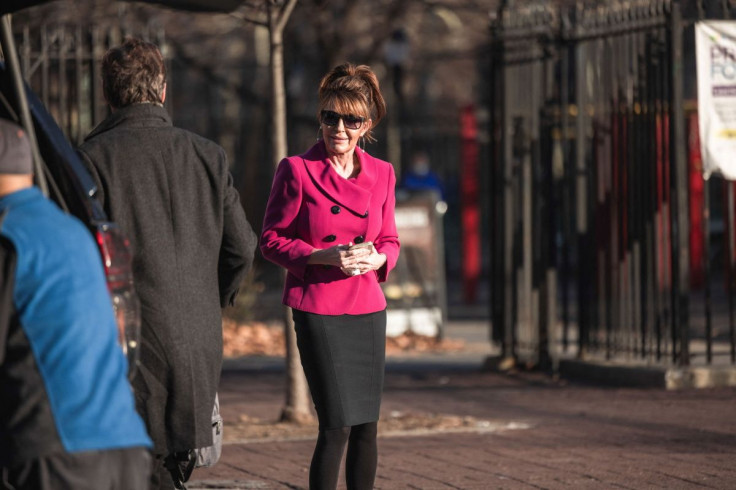N.Y. Times Ex-editor Denies Trying To Blame Sarah Palin For Congresswoman's Shooting

The former New York Times editor who oversaw the 2017 editorial underlying Sarah Palin's defamation lawsuit against the newspaper on Wednesday denied trying to blame the prominent Republican for the 2011 mass shooting that seriously wounded former U.S. congresswoman Gabrielle Giffords.
James Bennet testified during the trial's fifth day that changes he made to a draft of the editorial, which the Times later corrected, were not intended to hold the former Alaska governor and 2008 Republican U.S. vice presidential candidate or her political action committee responsible for the shooting.
"Did you intend to cause Ms. Palin any harm through any of your edits to the draft?" the Times' lawyer David Axelrod asked Bennet, a former Times editorial page editor, in Manhattan federal court.
"No, I didn't," Bennet responded.
Bennet also said "no" when asked if he tried to blame Palin or the political action committee.
The trial is a test of longstanding legal protections for U.S. media against defamation claims by public figures.
Palin sued the newspaper over a June 14, 2017, editorial about gun control and that lamented the deterioration of political discourse. It was written after a shooting at a Virginia baseball field where U.S. Representative Steve Scalise, a Louisiana Republican, was wounded.
The editorial referred to the January 2011 shooting in an Arizona parking lot by gunman Jared Lee Loughner where six people died and Giffords, a Democratic member of the U.S. House of Representatives at the time, was among those wounded.
It referred to Palin's political action committee having earlier circulated a map that put Giffords and 19 other Democrats under cross hairs.
Bennet added incorrect language to a colleague's draft that said "the link to political incitement was clear" between the map and the Giffords shooting.
In Wednesday's testimony, Bennet maintained that he added the language while under deadline pressure without researching the issue, thinking that an "atmosphere of such highly charged political rhetoric" could prompt such incidents.
Bennet also denied adding the language in order to suggest Loughner used the cross hairs map.
"If I thought it caused the violence, I would have used the word 'cause,'" Bennet said. "I should have slowed down."
The Times' correction of the editorial did not mention Palin. Her lawyers have pointed to that omission several times, and tried to show the correction was too slow.
Bennet testified on Tuesday that the Times does not apologize for corrections but he thought its correction served as an apology to Palin, even if she did not take it that way.
"I have regretted this pretty much every day since," Bennet said on Wednesday.
To win, Palin must prove that Bennet and the Times acted with "actual malice," meaning they knew the editorial was false or had reckless disregard for the truth.
She has signaled that if she lost at trial, her appeal would challenge a landmark 1964 U.S. Supreme Court decision, New York Times v Sullivan, that established the actual malice standard.
Bennet is the fifth current or former Times employee called by Palin's lawyers to testify. The trial is unusual because plaintiffs' lawyers normally call witnesses supporting their client. Palin is expected to testify at the trial.
© Copyright Thomson Reuters 2024. All rights reserved.







